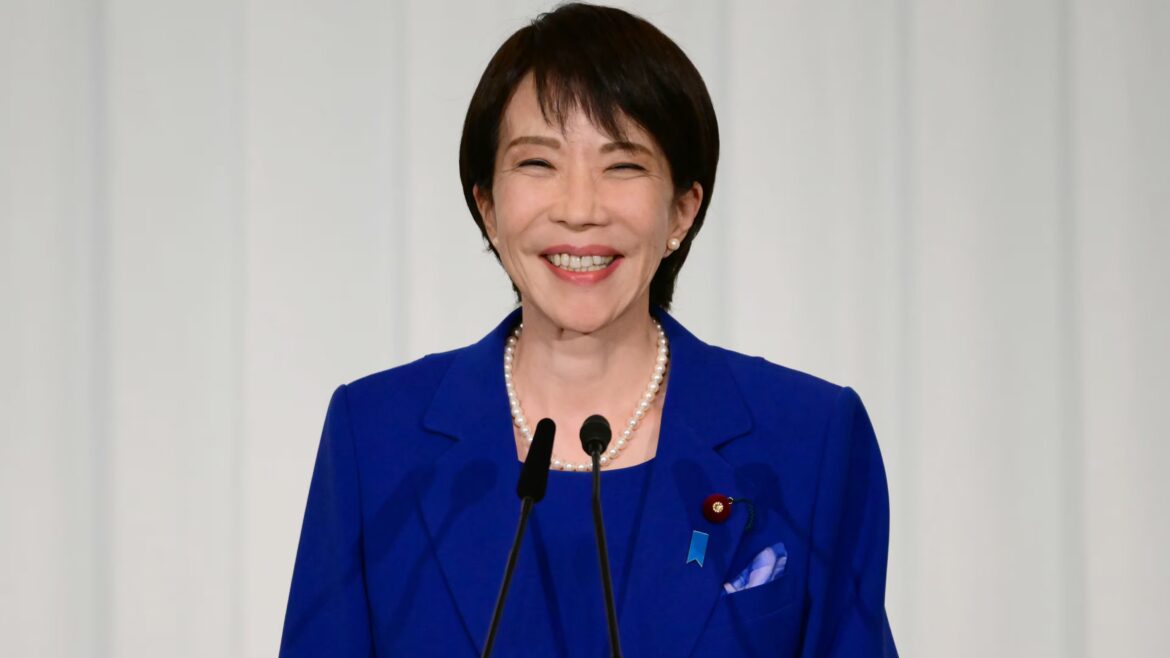Tokyo: Japan’s ruling Liberal Democratic Party (LDP) elected former Economic Security Minister Sanae Takaichi as its new leader on Saturday, making her likely to become the country’s first female prime minister. A hard-line ultra-conservative and China hawk, Takaichi’s elevation marks a historic milestone in a nation that ranks poorly internationally for gender equality.
The 64-year-old Takaichi, one of the most conservative members of the male-dominated party, is an admirer of former British Prime Minister Margaret Thatcher and a protégé of former Japanese Prime Minister Shinzo Abe’s ultra-conservative vision. She is also a regular visitor to the Yasukuni Shrine, a symbol of Japan’s wartime militarism, which could complicate Tokyo’s relations with its Asian neighbours.
Takaichi defeated Agriculture Minister Shinjiro Koizumi, son of popular former Prime Minister Junichiro Koizumi, in a runoff vote by the LDP on Saturday. She succeeds Prime Minister Shigeru Ishiba as the party seeks to regain public support and maintain power following major election losses. Takaichi is expected to become Japan’s next prime minister because the LDP remains the largest party in the lower house, which determines the national leader, and because opposition groups are highly fragmented.
Addressing domestic and diplomatic priorities, Takaichi said she would immediately work to curb rising prices while focusing on security and foreign policy challenges. A parliamentary vote to formalise her premiership is expected in mid-October. The LDP, criticised for creating a prolonged political vacuum, noted that Takaichi would soon face a crucial diplomatic test: a potential summit with US President Donald Trump, who may press Japan to increase its defence spending. The meeting is reportedly planned for late October, coinciding with Trump’s visit to the Asia-Pacific Economic Cooperation summit in South Korea starting October 31.
Ensuring a strong Japan-US alliance is her top diplomatic priority. Takaichi emphasised the need to reinforce cooperation through three-way frameworks with regional partners including South Korea, Australia, and the Philippines, pledging a greater Japanese role in achieving a free and open Indo-Pacific. She also affirmed respect for all tariffs and investment agreements established between Tokyo and Washington under the Ishiba administration.
Domestically, Takaichi faces major challenges. Consecutive LDP losses in parliamentary elections over the past year have left the party in the minority in both houses. She will need to restore voter confidence, stabilise the party, and secure cooperation from key opposition groups to implement policy initiatives. Ishiba, who reached a 15 per cent tariff deal with Washington and strengthened Japan’s relations with South Korea and other Asian nations during his one-year tenure, urged the LDP to unite under Takaichi to serve the country, the people, and the world. Ishiba, a centrist and longtime archrival of Abe, was effectively pressured to resign by the party’s ultra-conservative faction.
Five candidates, two current and three former ministers contested the LDP leadership. The election involved 295 LDP parliamentarians and roughly one million dues-paying members, representing only about 1 per cent of the Japanese public. The choice of Takaichi over the more centrist Koizumi highlights the party’s strategy to reclaim conservative voters who supported far-right groups such as Sanseito in the July parliamentary elections. At the same time, the LDP is expected to seek support from centrist opposition parties and expand its coalition with the moderate Komeito.
During her campaign, Takaichi presented herself as a “moderate conservative,” avoiding emphasis on her anti-China stance and other conservative social policies to signal willingness to cooperate with opposition parties. She stated that the Yasukuni Shrine issue should not become a diplomatic concern, pledging to respect the war dead while praying for peace. Takaichi also supports higher fiscal spending for growth, a stronger military, cybersecurity, and stricter regulations on increasing foreign tourists and labourers.
She faced criticism for citing unverified reports to accuse foreigners of mistreating deer in her hometown of Nara and claiming that many foreign law offenders escaped indictments due to a shortage of translators. Analysts noted that candidates largely avoided discussing contentious topics such as historical issues, same-sex marriage, the party’s political funds scandal, and anti-corruption measures. This avoidance has raised doubts about the LDP’s ability to regain public trust.


AloJapan.com